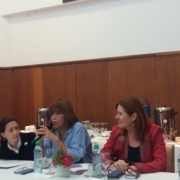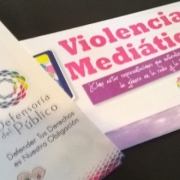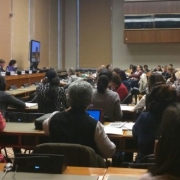First subject on abortion at the Faculty of Medicine of the National University of Córdoba
The Optional Subject “The sanitary problem of Abortion in Argentina” began to be dictated in the Faculty of Medical Sciences of the National University of Córdoba.
“Below, we offer a google translate version of the original article in Spanish. This translation may not be accurate but serves as a general presentation of the article. For more accurate information, please switch to the Spanish version of the website. In addition, feel free to directly contact in English the person mentioned at the bottom of this article with regards to this topic”.
On Wednesday, August 14, he represented a before and after in one of the most traditional and consecrated houses of study in the city of Córdoba. For the first time a training space on abortion was opened in the Medicine career of the National University
This initiative responds to the need to fill a void of said theme in the Faculty, promoting the first academic curricular space for undergraduate education that comprehensively addresses the problem of termination of pregnancy. The academic proposal promotes the interdisciplinary approach that this situation requires through the inclusion of students of Medicine and Nursing, Nutrition, Phonoaudiology, Kinesiology and Physiotherapy and Medical Technology degrees.
Throughout its curriculum, the perspective of sexual and (non-reproductive) rights, the legal framework and socio-sanitary situation in Córdoba, Argentina and the region will be addressed, as well as the Care Protocols in situations of Legal Interruption of Pregnancy according to Current national legislation. The subject, intended for undergraduate students, proposes a training in which current legislation will be addressed, and will provide the technical tools to provide the corresponding care in the face of legal interruptions of pregnancy, among other related contents.
The space is the result of the work of the teaching team composed of the Dras. Mariana Butinof and Gladys Ponte, the Mgters. Alejandra Domínguez of the Faculty of Social Sciences, and Prof. Med. Julieta Dahbar, Med. Helena Facchin, Med. Camila Blanco, Med. Ana Nahas, Est. Leticia Pérez and Est. Sol Domínguez. The initiative is supported by the Gender Program of the UNC Secretariat of Extension.This group of medical and integral health professionals decided to organize themselves to generate an interdisciplinary space of social approach in front of a State that, instead of guaranteeing this right of people with pregnant capacity, throws them and condemns them underground. “This has enabled us to remove the problem of Abortion in academic and institutional spaces from the closet and address it from a human rights, gender and Public Health perspective,” in the words of the team that supports the space. Its commitment is to the construction of a Faculty that deals with the training of future Health professionals committed to social demands and in this matter in particular, the Abortion theme as a socio-sanitary problem of Argentina and Latin America.
Abortion is the leading cause of maternal death in the world, therefore it is a public health problem. The impossibility of real access to a legal abortion is one of the many violations of rights of the patriarchal and capitalist system on the body of women that are still in force. Deaths due to clandestine abortions are state femicides. It is necessary that the initiative of the UNC, as it was the chair on abortion opened two years ago at the Faculty of Medicine of Rosario, is transmitted to all the houses of study and state institutions, encouraging the construction of spaces in which disseminate a comprehensive and gender health perspective.
Seven years after the FAL ruling of the Supreme Court of Justice clarifying the scope of the non-punishable abortion, and the dissemination of the Protocol for the Comprehensive Care of Persons with the Right to Legal Interruption of Pregnancy of the Ministry of Health of the Nation, the majority of those who work in the health system continue to hinder people’s access to this right. In this context, the initiative to include these perspectives from training, as well as to demand greater positioning and encourage more interventions by university institutions to address these problems, is key in this context. Promoting respect for the human right of people to decide on their own body, thus advancing in a comprehensive health perspective, is essential for the training of professionals committed to building a more just society.
Author
Lucia Calabria Aragon
Contact
Cecilia Bustos Moreschi cecilia.bustos.moreschi@fundeps.org





